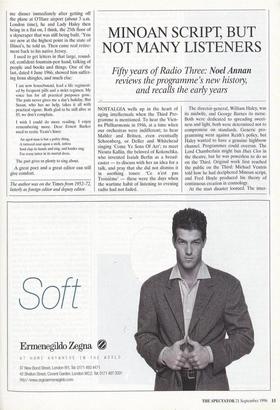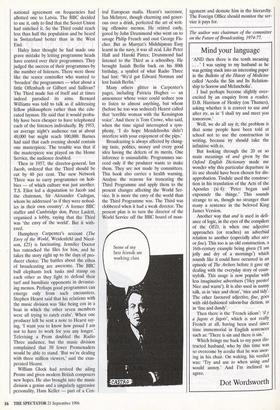MINOAN SCRIPT, BUT NOT MANY LISTENERS
Fifty years of Radio Three: Noel Annan reviews the programme's new history, and recalls the early years
NOSTALGIA wells up in the heart of aging intellectuals when the Third Pro- gramme is mentioned. To hear the Vien- na Philharmonic in 1946, at a time when our orchestras were indifferent; to hear Mahler and Britten, even eventually Schoenberg, or Deller and Whitehead singing 'Come Ye Sons Of Art'; to meet Niouta Kallin, the beloved of Kokoschka, who invented Isaiah Berlin as a broad- caster — to discuss with her an idea for a talk, and pray that she did not dismiss it in soothing tones: `Ce n'est pas Troisieme' — these were the days when the wartime habit of listening to evening radio had not faded.
The director-general, William Haley, was its midwife, and George Barnes its nurse. Both were dedicated to spreading sweet- ness and light, both were determined not to compromise on standards. Generic pro- gramming went against Reith's policy, but Haley wanted to have a genuine highbrow channel. Programmes could overrun. The Lord Chamberlain might ban Huis Clos in the theatre, but he was powerless to do so on the Third. Original work first reached the public on the Third: Michael Ventris told how he had deciphered Minoan script, and Fred Hoyle produced his theory of continuous creation in cosmology.
At the start disaster loomed. The inter- national agreement on frequencies had allotted one to Latvia. The BBC decided to use it, only to find that the Soviet Union had snitched it. So the Third could reach less than half the population and be heard in Switzerland better than in the West End.
Haley later thought he had made one grave mistake by letting programme heads have control over their programmes. They judged the success of their programmes by the number of listeners. There were those like the senior controller who wanted to 'broaden' the programmes — what about a little Offenbach or Gilbert and Sullivan? The Third made fun of itself and at times indeed parodied its aims. Bernard Williams was told to talk as if addressing fellow philosophers rather than the edu- cated layman. He said that it would proba- bly have been cheaper to have telephoned each of the listeners individually. By 1953, an average night's audience ran at about 40,000 but might reach 100,000. Barnes had said that each evening should contain one masterpiece. The trouble was that if the masterpiece was played on the Home Service, the audience doubled.
Then in 1957, the director-general, Ian Jacob, ordered that the Third should be cut by 40 per cent. The new Network Three was to carry programmes on hob- bies — of which culture was just another. T.S. Eliot led a deputation to Jacob and the chairman, Sir Alexander Cadogan, whom he addressed as if they were nobod- ies in their own country'. A former BBC staffer and Cambridge don, Peter Laslett, organised a lobby, saying that the Third was 'the envy of the world'. But it with- ered.
Humphrey Carpenter's account (The Envy of the World, Weidenfeld and Nicol- son, 125) is fascinating. Jennifer Doctor has ransacked the files for him, and he takes the story right up to the days of pro- ducer choice. The battles about the ethos of broadcasting are awesome. The BBC bull elephants lock tusks and stamp on each other as they fight to defend their turf and humiliate opponents in devastat- ing memos. Perhaps good programmes can emerge only from such encounters. Stephen Hearst said that his relations with the music division was 'like being cox in a boat in which the other seven members were all trying to catch crabs'. When one producer left he sent a note to Hearst say- ing, 'I want you to know how proud I am not to have to work for you any longer.' Televising a Prom doubled the Radio Three audience, but the music division complained that 50 fewer Promenaders would be able to stand. 'But we're dealing with three million viewers,' said the exas- perated Hearst.
William Glock had revived the ailing Proms and given modern British composers new hopes. He also brought into the music division a genius and a singularly aggressive personality, Hans Keller — part of a Cen-
tral European mafia. Hearst's successor, Ian McIntyre, though charming and gener- ous over a drink, perfected the art of writ- ing offensive memos. He retired early, gored by John Drummond who went on to savage Philip French and oust George Fis- cher. But as Marryat's Midshipman Easy learnt in the navy, it was all zeal. Like Peter Hall and Harold Pinter, Drummond had listened to the Third as a schoolboy. He brought Isaiah ,Berlin back on his 80th birthday, a symbol of what Radio Three had lost: 'We'd got Edward Norman and lost Isaiah Berlin.'
Many others glitter in Carpenter's pages, including Patricia Hughes — an announcer whose voice could seduce you to listen to almost anything, but whom (before he too was seduced) Hearst called that 'terrible woman with the Kensington voice'. And there is Tom Crowe, who said, when the time signal interrupted a sym- phony, 'I do hope Mendelssohn didn't interfere with your enjoyment of the pips.'
Broadcasting is always affected by chang- ing taste, politics, money and every good idea having the defects of its merits. One inference is unassailable. Programmes suc- ceed only if the producer wants to make them. They are not made by committees. This book also carries a health warning. Analyse the reasons for truncating the Third Programme and apply them to the present changes affecting the World Ser- vice. It is more the envy of the world than the Third Programme was. The Third was clobbered when it had a weak director. The present plan is to turn the director of the World Service off the BBC board of man-
Some of my best friends are working class agement and demote him in the hierarchy. The Foreign Office should monitor the ser- vice it pays for.
The author was chairman of the committee on the Future of Broadcasting, 1974-77



















































































 Previous page
Previous page